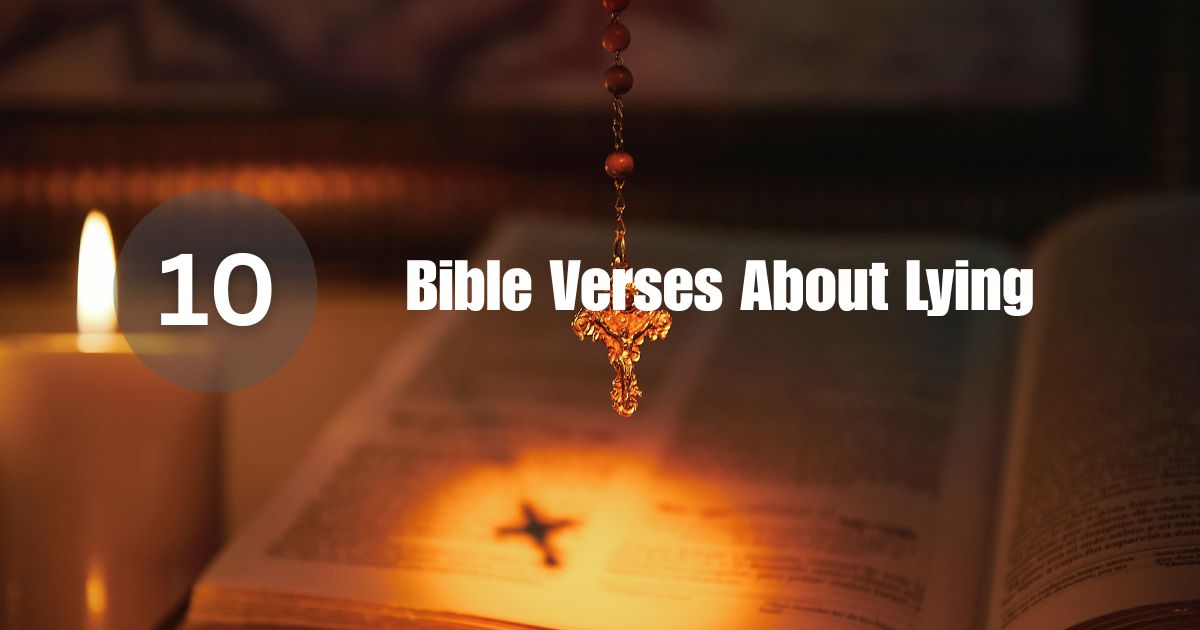We’ve all been there. The little white lie to avoid hurting someone’s feelings. The exaggeration to make a story more compelling. The outright deception to cover up a mistake. Lying feels like a normal part of human interaction, yet it often leaves us feeling guilty and disconnected.
But why does the Bible speak with such severity about something so common? This article goes beyond a simple list of verses. We will explore what God’s Word truly says about lying, understand the profound reasons behind its warnings, and discover the hopeful path toward a life of radical honesty and integrity.
At a Glance: Key Bible Verses About Lying
For those looking for a quick reference, here are the most frequently cited Scriptures on lying and deceit:
| Verse Reference | Key Message |
| Proverbs 12:22 | Lying lips are an abomination to the Lord. |
| Colossians 3:9-10 | Do not lie to each other, since you have taken off your old self. |
| Ephesians 4:25 | Put away falsehood and speak truthfully to your neighbor. |
| Revelation 21:8 | All liars will have their place in the lake of fire. |
| Proverbs 19:9 | A false witness will not go unpunished. |
| John 8:44 | The devil is the father of lies. |
| Exodus 20:16 | You shall not give false testimony (9th Commandment). |
| Acts 5:1-11 | The story of Ananias and Sapphira’s fatal deception. |
| Proverbs 6:16-19 | A lying tongue is among the seven things God hates. |
| Psalm 101:7 | No one who practices deceit will dwell with God. |
A Deep Dive into Bible Verses About Lying
To truly understand God’s perspective, we need to look deeper than the surface. Let’s explore the context and meaning of these pivotal verses.
1. Proverbs 12:22 – The Heart of God
“Lying lips are an abomination to the Lord, but those who act faithfully are his delight.” (ESV)
- The Context: The book of Proverbs is a collection of wisdom sayings, largely from King Solomon, designed to teach people how to live wisely and rightly in the world God created.
- The Meaning: The word “abomination” (Hebrew: tôʻêbâh) is a strong term used for things that are morally detestable and utterly revolting to God. It’s used elsewhere to describe idolatry and perverse practices. This places lying not as a minor flaw but a fundamental offense against God’s character.
- The Application: This verse isn’t just about avoiding lies; it’s about actively delighting God by being a person of faithfulness (emes – truth, reliability). It challenges us to ask: Do my words cause God disgust or delight?
2. Colossians 3:9-10 – The Identity Argument
“Do not lie to one another, seeing that you have put off the old self with its practices and have put on the new self, which is being renewed in knowledge after the image of its creator.” (ESV)
- The Context: The Apostle Paul wrote this letter to a church he had never visited, combating false teachings. In Chapter 3, he shifts to practical living, arguing from identity: because you are a new creation in Christ, you must live like it.
- The Meaning: Lying is classified as a “practice of the old self.” It is incompatible with the new nature given to a believer. Truthfulness is part of the renewal process, restoring us to the image of God, who is truth.
- The Application: The command isn’t based on “or else” but on “because you are.” Christians are called to truthfulness because it’s who we are now in Christ. Lying is a contradiction of our new identity.
3. John 8:44 – The Origin of Lies
“You are of your father the devil, and you will is to do your father’s desires. He was a murderer from the beginning, and does not stand in the truth, because there is no truth in him. When he lies, he speaks out of his own character, for he is a liar and the father of lies.” (ESV)
- The Context: Jesus is in a heated debate with religious leaders who claimed to know God but rejected His Messiah. He pulls back the curtain on the spiritual battle behind their unbelief.
- The Meaning: Jesus traces the origin of lying back to Satan himself. Lying isn’t just a human mistake; it’s a satanic strategy. To choose a lie is to align oneself with the enemy’s character and agenda. In contrast, Jesus defines himself as “the way, the truth, and the life” (John 14:6).
- The Application: This reframes every temptation to lie. It’s not just a choice between truth and falsehood; it’s a choice between aligning with God’s character or the devil’s
4. Ephesians 4:25 – The Community Imperative
“Therefore, having put away falsehood, let each one of you speak the truth with his neighbor, for we are members one of another.” (ESV)
- The Context: This verse is part of the Apostle Paul’s instructions to the church in Ephesus on how to live as a new creation in Christ. The preceding verses talk about leaving the old, corrupt self behind.
- The Meaning: The command to stop lying is not just personal; it’s communal. The reason given is profound: “for we are members one of another.” Lying isn’t just a personal sin; it’s a form of self-harm against the body of Christ, like a hand deliberately misleading a foot. Truth is the lifeblood of healthy community.
- The Application: This reframes honesty as a vital act of love for our Christian brothers and sisters. Are my words building up the body of Christ by fostering trust, or are they tearing it down by introducing deceit?
5. Proverbs 19:5, 9 – The Inevitable Consequence
“A false witness will not go unpunished, and he who breathes out lies will not escape.” (v.5, ESV) | “A false witness will not go unpunished, and he who breathes out lies will perish.” (v.9, ESV)
- The Context: These proverbs, like many others, are set in the framework of wisdom literature that contrasts the path of the righteous with the path of the foolish, highlighting the natural consequences of each.
- The Meaning: The repetition of this concept (a literary device for emphasis in Hebrew poetry) underscores a fundamental law of the moral universe: deceit carries inescapable consequences. This isn’t always immediate temporal punishment, but it points to the ultimate unraveling that lies cause—in relationships, reputations, and ultimately, before a holy God.
- The Application: This verse is a sobering warning against the illusion that a lie can be controlled or contained. It challenges us to consider the inevitable fallout of our deceit, encouraging us to choose the path of truth, which leads to life and freedom.
6. Leviticus 19:11 – The Comprehensive Command
“You shall not steal; you shall not deal falsely; you shall not lie to one another.” (ESV)
- The Context: God is giving the Law to Moses on Mount Sinai, outlining for the nation of Israel what it means to be His holy people. This verse is nestled in a chapter often called the “Holiness Code.”
- The Meaning: Lying is grouped with stealing and deceitful dealing. This shows that God views dishonesty in speech as a form of theft—we steal someone’s right to reality, to make informed decisions, and to trust. It is a violation of justice and a breach of covenant community living.
- The Application: Holiness in God’s eyes is not just about grand religious acts; it is intimately connected to everyday honesty. It asks: Am I conducting all my affairs—business, personal, and social—with complete integrity?
Find Out More : 50 Powerful Bible Verses About Honesty
7. Psalm 101:7 – The Standard for God’s Presence
“No one who practices deceit shall dwell in my house; no one who utters lies shall continue before my eyes.” (ESV)
- The Context: This is a Psalm of David, expressing his commitment to lead his kingdom and his own household with integrity and justice.
- The Meaning: David sets a high standard for his court: no deceitful person is welcome. This reflects an even greater spiritual truth: God’s presence cannot coexist with unrepentant deceit. To “dwell in God’s house” is to enjoy fellowship with Him, a fellowship that requires truthfulness (Psalm 15:1-2).
- The Application: This moves beyond the consequence of punishment to the consequence of separation. Unrepentant lying creates a barrier to intimate fellowship with God. It prompts the question: Is my habit of dishonesty hindering my closeness with God?
8. Zechariah 8:16-17 – The Blueprint for God’s People
“These are the things that you shall do: Speak the truth to one another; render in your gates judgments that are true and make for peace; do not devise evil in your hearts against one another, and love no false oath, for all these things I hate, declares the Lord.” (ESV)
- The Context: The prophet Zechariah is encouraging the returned exiles who are rebuilding Jerusalem. God is giving them a vision for the righteous community He desires to establish among them.
- The Meaning: Truthfulness is presented as the very foundation for a peaceful, functional, and God-honoring society. It is to be practiced in everyday speech (“speak the truth”), in the public square (“render… true judgments”), and in the heart (“do not devise evil”). God explicitly states His hatred for its opposite.
- The Application: God’s vision for His people is a community of truth-tellers. This applies to our churches and families today. Are we building communities where truth is spoken in love, fostering real peace and justice?
9. Proverbs 14:5 – The Character of a Witness
“A faithful witness does not lie, but a false witness breathes out lies.” (ESV)
- The Context: Another wisdom saying from Solomon, contrasting the character of two types of people: the faithful and the false.
- The Meaning: The Hebrew word for “breathes out” (yāpîach) suggests something constant and natural, like exhaling. For a false witness, lying isn’t an occasional slip; it’s a reflexive, ingrained part of their character. In contrast, a faithful witness’s character is defined by reliability and truth.
- The Application: This verse forces self-reflection: Is honesty my default setting, something that comes naturally from my character? Or is lying a well-practiced reflex I need the Holy Spirit to reshape?
10. Acts 5:3 – The Case Study of Ananias and Sapphira
“But Peter said, ‘Ananias, why has Satan filled your heart to lie to the Holy Spirit and to keep back for yourself part of the proceeds of the land?'” (v.3, ESV)
- The Context: In the early, Spirit-filled days of the church, believers were voluntarily selling possessions and giving the proceeds to the apostles to care for the community.
- The Meaning: This story is not primarily about greed, but about deceit. Ananias and Sapphira wanted the appearance of radical generosity without the actual sacrifice. Peter makes it clear their sin was not keeping money, but lying to the Holy Spirit, trying to deceive God Himself, by presenting a false reality to the church. The severe judgment underscores how seriously God treats deception that infects the worship and community of His people.
- The Application: This serves as a sobering warning against performative righteousness, trying to appear more spiritual than we are. It asks: Am I being completely honest with God and others about my motives, my struggles, and my commitment, or am I crafting a spiritual image?.
What Does The Bible Say About lying?
The Bible presents lying as a sin directly opposed to God’s truthful nature (Numbers 23:19) and sternly condemns it. Verses like Proverbs 12:22 call lying lips “an abomination to the Lord,” while Ephesians 4:25 commands believers to “put away falsehood” and speak truth, highlighting how deceit breaks down trust and community.
Lying is tied to Satan, called “the father of lies” in John 8:44, and carries serious consequences—damaging relationships, inviting judgment, and hindering fellowship with God (Psalm 101:7; Revelation 21:8). Yet the Bible also offers grace, urging confession and reliance on the Spirit to live truthfully (1 John 1:9; Colossians 3:9–10).
Why Does God Hate Lying? The Deeper Reasons
Synthesizing these verses, we see three core reasons why Scripture condemns lying so strongly:
- It Violates His Nature: God is fundamentally truth (Numbers 23:19; Titus 1:2). Lying is a direct assault on His character. It introduces chaos and distortion into a world He created to reflect His order and truth.
- It Destroys Relationships: Truth is the glue of trust, and trust is the foundation of healthy families, churches, and communities. Lying shatters that trust and fractures relationships, mirroring the division Satan seeks to create.
- It Enslaves the Liar: Lies create a false reality that the liar must then maintain. One lie often leads to another, creating a web of deception that enslaves the person in fear and anxiety of being exposed.
Navigating the Gray Areas: What About “White Lies” or Rahab?
This is the question most other articles fail to address adequately. How do we reconcile the absolute condemnation of lying with stories like Rahab lying to protect the Israelite spies (Joshua 2), which is commended for her faith (Hebrews 11:31)?
This is a complex theological issue, but here are two key perspectives to consider:
- The “No Exceptions” View: This view holds that lying is always a sin because God cannot lie and His commands are absolute. God commended Rahab’s faith and her desire to protect God’s people, not her lie. He sovereignly worked through her sinful choice to achieve His purposes, as He often does.
- The “Lesser of Two Evils” View: Some theologians argue that in extreme situations where two moral duties conflict (e.g., telling the truth vs. protecting innocent life), one may be obligated to choose the lesser evil. In this case, protecting life would take precedence over telling the truth to a murderous aggressor.
Rather than providing a simple answer, this tension calls us to wisdom. It should drive us to pray for discernment in difficult situations and to remember that God looks at the heart. Our default must always be toward truth, and any deviation should be accompanied by tremendous soberness and grief, not casual exception-making.
How to Stop Lying: A Practical Path to Truthfulness
Knowing the problem isn’t enough. We need a solution. Here is a practical guide to cultivating honesty:
- Confess and Repent: Begin by being honest with God. Confess your lies to Him, asking for forgiveness based on the finished work of Christ (1 John 1:9). This cleanses your conscience and restores your relationship with Him.
- Confess to Others: If your lies have harmed others, go to them. Confess specifically, ask for forgiveness, and make amends where possible (James 5:16). This is humbling but incredibly freeing.
- Pause Before You Speak: Develop the habit of taking a breath before responding. Use that moment to ask, “Is what I’m about to say true, necessary, and kind?”
- Embrace Accountability: Tell a trusted friend or small group about your struggle with dishonesty. Give them permission to ask you hard questions like, “Is that the whole story?” or “Are you being completely honest right now?”
- Fill Your Mind with Truth: Regularly meditate on Scripture about truth and honesty. You become what you behold. As you fill your mind with God’s truth, it will naturally begin to overflow into your speech.
Read More : 50 Powerful Bible Verses About Revenge
Conclusion: The Way, The Truth, and The Life
The Bible’s message on lying is severe because the consequences are eternal. But it is ultimately a message of hope. Our hope is not in our own ability to never tell a lie again. Our hope is in a Person, Jesus Christ, who is “the way, and the truth, and the life” (John 14:6).
In Him, we find forgiveness for every lie we’ve ever told. In Him, we receive a new nature that desires truth. And through His Spirit living in us, we are given the power to put off the old self with its deceitful practices and to put on the new self, created to be like God in true righteousness and holiness.
The journey toward truthfulness starts not with trying harder, but with trusting more fully in the One who is Truth itself.

I’m Roman, the author of starspotlights.com. I collect clear Bible verses and give short, easy explanations. My goal is to make Scripture simple for everyone — beginners, busy people, and anyone who wants to learn.










